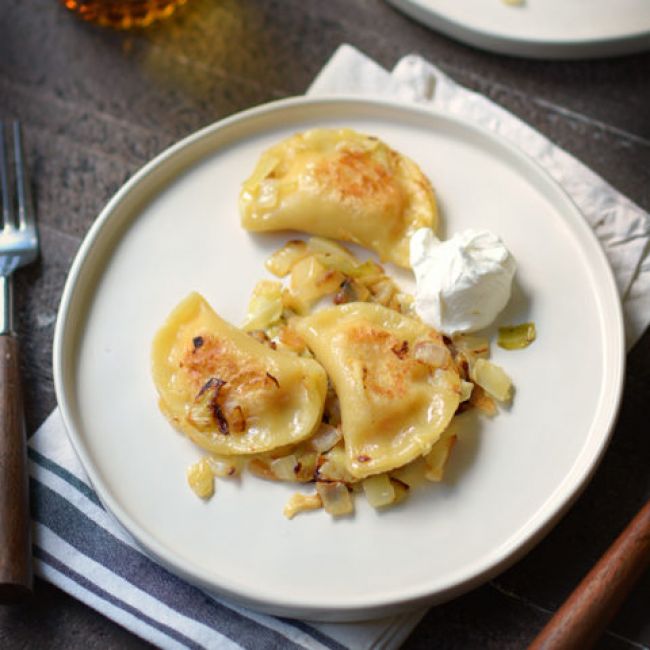My grandmother gave me the recipe for these homemade pierogi. a cheesy potato stuffing inside a delicate dough.
A Pierogi crescent-shaped dumplings, which employ materials that are presumably already in the pantry, are just like the ones Babcia used to prepare.
Serve them hot as a savory side dish or as the main course with a dollop of sour cream!
Outstanding Homemade Pierogi
- I frequently cooked with my Polish grandma when she prepared this meal.
- The ingredients are likely something you already have in your pantry.
- Both sides and main dishes can be made using these.
- Old-world comfort food perogies always turn out wonderfully.
- They cook straight from frozen after a wonderful freeze.

(Pinterest)
Pierogi definition
This delicacy, which is pronounced “puh-row-gee,” can also be written as perogy, perogies, or pierogies.
Whatever way you spell it, pierogi—which are officially plural but are still referred to as pierogies—are one of Poland’s greatest foods and a favorite throughout eastern Europe.
A variety of sweet or savory fillings, such as blueberries, cottage cheese, or even sauerkraut, can be easily prepared by stuffing a flour-based dough. They are pan-fried until golden brown after being cooked in water until they float.
The simple potato and cheese perogies in this dish (also known as pierogi ruskie) are frequently served with sour cream, caramelized onions, and butter.
Ingredients
DOUGH:
Unlike pasta, pierogies dough is softer and less dense, and it will continue to be soft even after cooking.
I do not advise making changes to the dough to achieve the correct consistency. While some recipes call for sour cream, this one does not.
FILLING:
A very smooth blend of potatoes, cheddar cheese, and a small amount of finely diced sautéed onions make up the filling of these traditional pierogis.
- Choose a starchy potato for this dish, like russet or baked potato, exactly as you would for mashed potatoes because the filling is mashed.
- Cheese – Cheddar that has been finely shredded is added to the potatoes; it’s preferable to do this yourself from a block of cheese.
- White onion is extremely finely sliced and fried in butter as a seasoning (be sure not to brown). To keep the creamy hue, my granny always used white pepper, but if you only have black pepper, use that instead.
Creating Pierogies
- We set aside a day to prepare several batches of this dish because it takes some time. It’s enjoyable to do as a family and reminds me of my childhood.
- Prepare the dough as directed in the recipe below, then give it a light kneading. The dough should not be overworked, and it should be given time to rest.
- Cook the potatoes and onions in butter to prepare the filling.
- Shredded cheddar cheese is added to the mashed potatoes. Let it cool.
- The dough should be rolled into 3″ diameter, 1/8″ thick circles.
- The mashed potato mixture should be added to each circle, then the edges should be pressed together to form a seal.
Cook the pierogies as directed below, or freeze them for later use.
How to Make Great Pierogis
Filling
- Make sure the filling is thoroughly mashed for a smooth texture.
- Make careful to shred your cheese because it will taste better if it is sharper.
- Just sauté the onions slightly without browning them.
- Mix the filling, taste it, and add more seasoning if necessary.
Dough
- The dough needs to be gently kneaded until it is smooth and malleable; avoid overworking it. As the dough is overworked, it becomes tough and excessively elastic, which makes it spring back when it is rolled out.
- The dough needs to be rolled out to a thickness of 1/8″ and then cut into circles measuring 3″ in diameter. Try cutting a 3′′ circle out of a jar lid if you don’t have a 3′′ circle cutter.
- The dough can also be pinched off and rolled into a circle that is about 3′′ in diameter and 1/8′′ thick (I weigh all of my dough and divide it into 65 pieces). My grandmother always made them this way, and I do the same thing most of the time.
- For the dough to not be too thick, make sure the portion that is pinched together is squeezed very thinly.
Cooking Pierogis
Cook some finely diced or sliced onion in butter over medium-low heat before frying the pierogi. The onion should soften but not become brown.
Boil: Bring a big saucepan of salted water to a boil while the onions are cooking. Pierogi should be added and cooked until they float. They are finished after they float.
Pierogi can be cooked and eaten, but we prefer to pan-fry them in butter until they are golden brown.
Getting Freeze
Pierogies are simple to construct and can be stored for up to three months in the freezer. Freeze pierogis in a single layer on a baking sheet lined with paper.
Put them in a zippered bag with the date written on the outside once they have frozen. No thawing is required before boiling!

(Pinterest)
Ingredients
Dough
- 6 cups all-purpose flour
- 2 cups cold water divided
- 2 eggs beaten
- 6 tablespoons canola or vegetable oil
- 2 teaspoons salt
Filling
- 3 ¾ pounds of baking potatoes
- 1 white onion finely diced
- ⅓ cup butter divided
- 4 ½ cups cheddar cheese finely shredded
- salt to taste
- white pepper to taste, or very fine black pepper
For serving
- 1 onion thinly sliced
- 2 tablespoons butter or as needed for frying
- 1 tablespoon of sour cream is optional, for serving
Instructions
Dough
- Add flour to a sizable bowl. Add 1 to 12 cups of water, eggs, oil, and salt. Add extra water as necessary to produce a dough after thoroughly mixing.
- On a flat surface, knead the dough for 3–4 minutes, or until it is smooth and malleable.
- The dough should rest for at least 30 minutes or up to an hour. Cover with plastic wrap.
filling
- Cut potatoes into 2″ cubes after peeling. Bring to a boil in a sizable pot of salted water. Till potatoes are soft, cook for 15 minutes.
- 2 tablespoons of butter should be heated while the potatoes are cooking. Onions should be added and cooked until soft but not browned.
- Put boiled potatoes in a big bowl and mash them. Add the cheese, onions, and leftover butter. Potatoes should be thoroughly smooth after further hand mashing.
put together *see note
- Roll out the second half of the dough until it is 1/8″ thick. Using a 3″ cookie cutter, make circles out of the dough.
- Each pierogi should have 1 to 1 1/2 tablespoons of filling. The dough is folded over into a semicircle, and the edges are sealed with pinches. Set in a baking pan.
- At this point, pierogies can either be cooked or frozen.
make food
- 3 tablespoons of butter are melted in a big skillet. Onions should be added and cooked until soft over medium-low heat. The onions should be taken out of the pan and left aside for serving.
- A large saucepan of salted water should be brought to a boil. Cook pierogies until they float after gently adding them. Use a slotted spoon to remove it.
- Pierogies should be moved to a heated skillet and cooked for about 5 minutes until browned on both sides.
- Serve heated with sour cream and onions.
Notes
Dough
- I do not advise making changes to the dough to achieve the correct consistency. While some recipes call for sour cream, this one does not.
- The dough needs to be gently kneaded until it is smooth and malleable; avoid overworking it. As the dough is overworked, it becomes tough and excessively elastic, which makes it spring back when it is rolled out.
- For the dough to not be too thick, make sure the portion that is pinched together is squeezed very thinly.
Filling
- For the filling, pick a starchy potato like baking or russet potatoes. Make sure to personally shred the cheese from a block.
- Onions should only be lightly sautéed until they are soft.
- After mixing, taste the filling and make any necessary seasoning adjustments.
Making the dough roll
The dough can also be pinched off and rolled into a circle that is about 3″ in diameter and 1/8″ thick (I weigh all of my dough and divide it into 65 equal pieces).
My grandmother always made them this way, and I do the same thing most of the time.
Freezing and Storing
- Pierogi can be refrigerated for up to three months after assembly.
- Freeze pierogies in a single layer on a baking sheet lined with paper.
- Put them in a zippered bag with the date written on the outside once they have frozen.
- You may cook straight from frozen without having to thaw it first.
